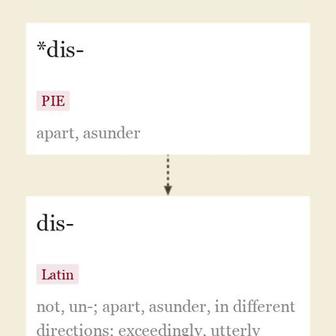Entries linking to disprivilege
mid-12c. "grant, commission" (recorded earlier in Old English, but as a Latin word), from Old French privilege "right, priority, privilege" (12c.) and directly from Latin privilegium "law applying to one person, bill of law in favor of or against an individual;" in the post-Augustine period "an ordinance in favor of an individual" (typically the exemption of one individual from the operation of a law), "privilege, prerogative," from privus "individual" (see private (adj.)) + lex (genitive legis) "law" (see legal (adj.)).
From c. 1200 as "power or prerogative associated with a certain social or religious position." Meaning "advantage granted, special right or favor granted to a person or group, a right, immunity, benefit, or advantage enjoyed by a person or body of persons beyond the common advantages of other individuals" is from mid-14c. in English. From late 14c. as "legal immunity or exemption."
Formerly of such things as an exemption or license granted by the Pope, or special immunity or advantage (as freedom of speech) granted to persons in authority or in office; in modern times, with general equality of all under the law, it is used of the basic rights common to all citizens (habeas corpus, voting, etc.).
Privilege is also more loosely used for any special advantage: as, the privilege of intimacy with people of noble character. Prerogative is a right of precedence, an exclusive privilege, an official right, a right indefeasible on account of one's character or position : as, the Stuart kings were continually asserting the royal prerogative, but parliament resisted any infringement upon its privileges. [Century Dictionary]
Middle English also had pravilege "an evil law or privilege" (late 14c.), from Medieval Latin pravilegium, a play on privilegium by substitution of pravus "wrong, bad."
word-forming element of Latin origin meaning 1. "lack of, not" (as in dishonest); 2. "opposite of, do the opposite of" (as in disallow); 3. "apart, away" (as in discard), from Old French des- or directly from Latin dis- "apart, asunder, in a different direction, between," figuratively "not, un-," also "exceedingly, utterly." Assimilated as dif- before -f- and to di- before most voiced consonants.
The Latin prefix is from PIE *dis- "apart, asunder" (source also of Old English te-, Old Saxon ti-, Old High German ze-, German zer-). The PIE root is a secondary form of *dwis- and thus is related to Latin bis "twice" (originally *dvis) and to duo, on notion of "two ways, in twain" (hence "apart, asunder").
In classical Latin, dis- paralleled de- and had much the same meaning, but in Late Latin dis- came to be the favored form and this passed into Old French as des-, the form used for compound words formed in Old French, where it increasingly had a privative sense ("not"). In English, many of these words eventually were altered back to dis-, while in French many have been altered back to de-. The usual confusion prevails.
As a living prefix in English, it reverses or negatives what it is affixed to. Sometimes, as in Italian, it is reduced to s- (as in spend, splay, sport, sdain for disdain, and the surnames Spencer and Spence).
Trends of disprivilege
More to Explore
updated on September 01, 2018
Trending words
Dictionary entries near disprivilege
dispose
disposed
disposition
dispossess
dispossession
disprivilege
disproof
disproportion
disproportionate
disprove
disputable

